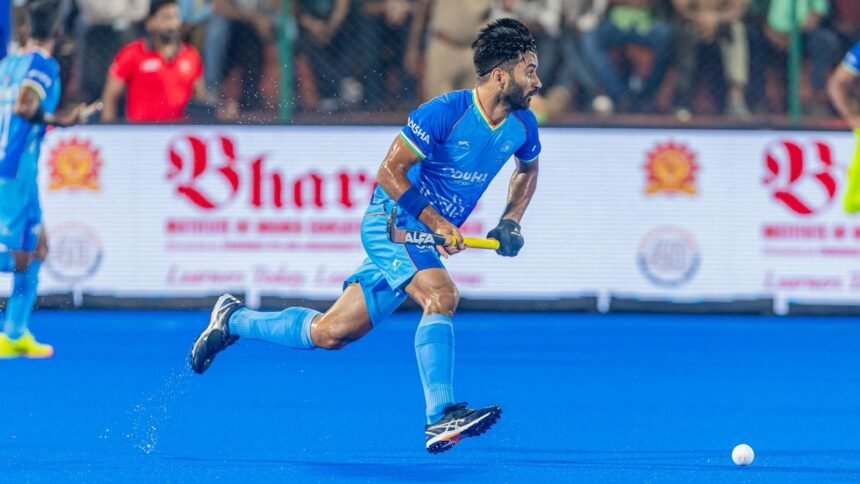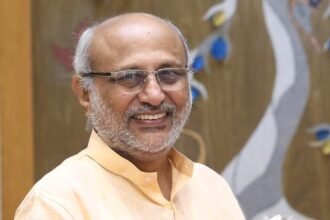The other day, Hardik Singh teased Manpreet Singh while also doing some math. “How many (matches) have you played, 402?” he asked in Punjabi. “I came into the team in 2018 and played 158. It means I needed eight years for 150 matches, so in 16 years I’ll complete 300 matches. To complete 400 matches, I’ll need a minimum of 18 years. And you keep saying Djokovic ne inna time hogaya (has been around for so long).”
Manpreet blushes so hard that his face gets pinker than the grip on his stick. Hardik was sincere in his admiration for the midfielder, who made his debut in 2011 and is gunning to be India’s most-capped player.
Hardik and Manpreet were bantering the morning after Novak Djokovic came back from a set down to beat American qualifier Zachary Svajda in the US Open second round. Much like the 38-year-old Serb, Manpreet, 33, has kept on reinventing himself and has been relying mainly on experience to quell any resistance from the opponents.
Like he did on Thursday night here during India’s comeback 4-1 win over Malaysia in an Asia Cup match that coach Craig Fulton described was like a ‘quarterfinal’.
A banana-skin team, Malaysia had India under the pump with a first-minute goal from Shafiq Hasan. It sent India into panic mode and suddenly, they played like 11 strangers in blue. The players ran into each other’s paths, couldn’t read their teammates’ runs or find the correct pass. The lack of coordination was quite something to witness. Another night of struggle beckoned.

Until the team won a penalty corner 26 seconds into the second quarter. It was a period of action that seemed stuck in a torturous loop. Hardik would inject, Manpreet stopped and Harmanpreet Singh’s flick would either be closed down by the brilliant first-rushing from Amirul Azhar, or saved by Hafizuddin Othman. Each save, brave as it was, kept being a foul.
There were five retakes, and with each, the Indian players and the Rajgir crowd kept getting frustrated. Until, out of nowhere, a crouching Manpreet sprang onto his feet — showing the agility of a doubles tennis player at the net — and slapped home a ball that rebounded from Othman’s pads while trying to save Harmanpreet’s flick.
Story continues below this ad
The goal, in the 17th minute, was all about timing and positioning, the two things India were miserable at for the entire first quarter. Manpreet’s strike was the inspiration the Indian team, whose shoulders were dropping, needed. It raised their spirits, ended Malaysia’s brief resistance and paved the way for India to record their first win of the Super 4s stage to take a giant step towards Sunday’s final.
Sparking a turnaround
Just how much the goal boosted the team’s confidence was visible two minutes later. Harmanpreet began the move with a simple pass to Jugraj Singh, who played it forward to Hardik. The centre-half spotted Abhishek unmarked at the top of the circle and passed forward. Abhishek, without wasting much time, found Shilanand Lakra on the right post. Lakra squared it in front of the goal, where Sukhjeet Singh was there to beat the goalkeeper.
Suddenly, all their struggles seemed a thing of the past. India were back to playing the signature free-flowing hockey, although the inconsistency would still concern Fulton.
What changed from the Wednesday night draw against South Korea and the first quarter against Malaysia was that India, rather than attempting complicated passes and spectacular goals, kept it simple.
Story continues below this ad
Short passes, quick movements, forwards getting into right positions inside the circle — far posts and penalty spots — and a proper understanding between the attackers, who weren’t going for individual glory but were willing to play an additional pass to find a teammate better placed to score.
The uncomplicated game led to two more goals from Lakra and Vivek Sagar Prasad, as India sealed a comprehensive win by the time the final hooter went. A win that would have been tough if not for the opening goal from Manpreet, who also provided the assist for the fourth goal.
“It’s huge what he is doing,” Hardik says of Manpreet. “He’s been playing since 2011 and is still going strong. I think, thode underrated hote hai hum hockey waale (us hockey players are a little underrated).”
‘Fittest in India’
It’s a grouse many hockey players hold — not about the attention they get, but the fact that the level of fitness they need isn’t always appreciated. “I say it with all humility, but we are the fittest players in India,” Hardik says, standing next to Manpreet.
Story continues below this ad
This time last year, Manpreet was at his ‘unfittest’. Last September, when India played the same opponents — South Korea, Malaysia, China — at the Asian Champions Trophy, Manpreet felt his feet dragging, reflexes waning and breathing heavily every time he had to chase the ball.
Feeling ‘heavy’, he stepped on the weighing machine. The needle stopped at 73kg, the heaviest he had weighed in his entire career. Upon reaching Jalandhar, the former captain went on a strict diet, spent his entire off-season training and working out. The result of that is the Manpreet 2.0 who was gliding on the field on Thursday night — a leaner, quicker and sharper midfielder, six kilos lighter, and six-packs to show off.
Manpreet and Hardik left the field together after the match. “He’s defeated his in-laws,” Hardik said, teasingly, referring to Manpreet’s wife, who is from Malaysia. Manpreet playfully punched him and both shared a hearty laugh. The bantering goes on.
Scoreline: India 4 (Manpreet Singh 17’, Sukhjeet Singh 19’, Shilanand Lakra 24, Vivek Sagar Prasad, 38’) bt Malaysia 1 (Shafiq Hasan 2’)








